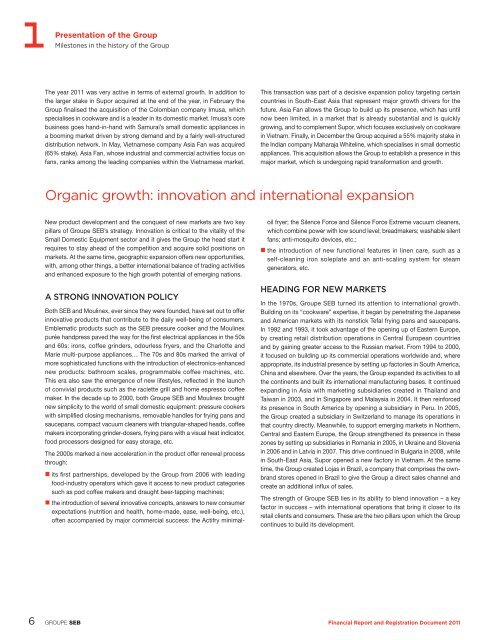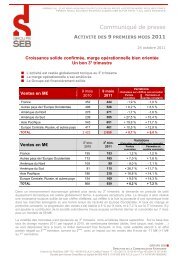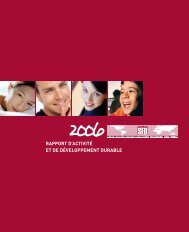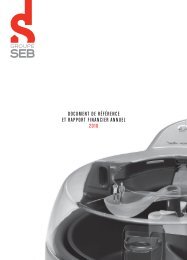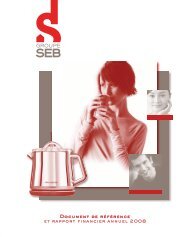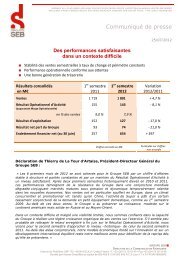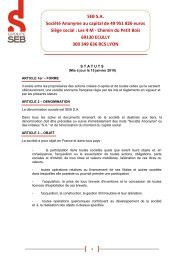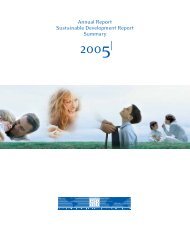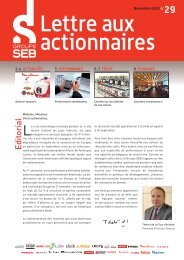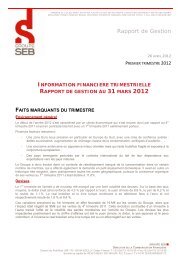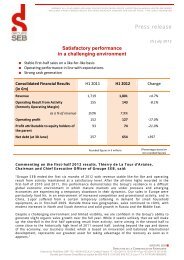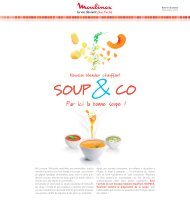financial report and registration document 2011 - Groupe SEB
financial report and registration document 2011 - Groupe SEB
financial report and registration document 2011 - Groupe SEB
Create successful ePaper yourself
Turn your PDF publications into a flip-book with our unique Google optimized e-Paper software.
1 Milestones<br />
Presentation of the Group<br />
in the history of the Group<br />
The year <strong>2011</strong> was very active in terms of external growth. In addition to<br />
the larger stake in Supor acquired at the end of the year, in February the<br />
Group fi nalised the acquisition of the Colombian company Imusa, which<br />
specialises in cookware <strong>and</strong> is a leader in its domestic market. Imusa’s core<br />
business goes h<strong>and</strong>-in-h<strong>and</strong> with Samurai’s small domestic appliances in<br />
a booming market driven by strong dem<strong>and</strong> <strong>and</strong> by a fairly well-structured<br />
distribution network. In May, Vietnamese company Asia Fan was acquired<br />
(65% stake). Asia Fan, whose industrial <strong>and</strong> commercial activities focus on<br />
fans, ranks among the leading companies within the Vietnamese market.<br />
This transaction was part of a decisive expansion policy targeting certain<br />
countries in South-East Asia that represent major growth drivers for the<br />
future. Asia Fan allows the Group to build up its presence, which has until<br />
now been limited, in a market that is already substantial <strong>and</strong> is quickly<br />
growing, <strong>and</strong> to complement Supor, which focuses exclusively on cookware<br />
in Vietnam. Finally, in December the Group acquired a 55% majority stake in<br />
the Indian company Maharaja Whiteline, which specialises in small domestic<br />
appliances. This acquisition allows the Group to establish a presence in this<br />
major market, which is undergoing rapid transformation <strong>and</strong> growth.<br />
Organic growth: innovation <strong>and</strong> international expansion<br />
New product development <strong>and</strong> the conquest of new markets are two key<br />
pillars of <strong>Groupe</strong> <strong>SEB</strong>’s strategy. Innovation is critical to the vitality of the<br />
Small Domestic Equipment sector <strong>and</strong> it gives the Group the head start it<br />
requires to stay ahead of the competition <strong>and</strong> acquire solid positions on<br />
markets. At the same time, geographic expansion offers new opportunities,<br />
with, among other things, a better international balance of trading activities<br />
<strong>and</strong> enhanced exposure to the high growth potential of emerging nations.<br />
A STRONG INNOVATION POLICY<br />
Both <strong>SEB</strong> <strong>and</strong> Moulinex, ever since they were founded, have set out to offer<br />
innovative products that contribute to the daily well-being of consumers.<br />
Emblematic products such as the <strong>SEB</strong> pressure cooker <strong>and</strong> the Moulinex<br />
purée h<strong>and</strong>press paved the way for the fi rst electrical appliances in the 50s<br />
<strong>and</strong> 60s: irons, coffee grinders, odourless fryers, <strong>and</strong> the Charlotte <strong>and</strong><br />
Marie multi-purpose appliances… The 70s <strong>and</strong> 80s marked the arrival of<br />
more sophisticated functions with the introduction of electronics-enhanced<br />
new products: bathroom scales, programmable coffee machines, etc.<br />
This era also saw the emergence of new lifestyles, refl ected in the launch<br />
of convivial products such as the raclette grill <strong>and</strong> home espresso coffee<br />
maker. In the decade up to 2000, both <strong>Groupe</strong> <strong>SEB</strong> <strong>and</strong> Moulinex brought<br />
new simplicity to the world of small domestic equipment: pressure cookers<br />
with simplifi ed closing mechanisms, removable h<strong>and</strong>les for frying pans <strong>and</strong><br />
saucepans, compact vacuum cleaners with triangular-shaped heads, coffee<br />
makers incorporating grinder-dosers, frying pans with a visual heat indicator,<br />
food processors designed for easy storage, etc.<br />
The 2000s marked a new acceleration in the product offer renewal process<br />
through:<br />
� its fi rst partnerships, developed by the Group from 2006 with leading<br />
food-industry operators which gave it access to new product categories<br />
such as pod coffee makers <strong>and</strong> draught beer-tapping machines;<br />
� the introduction of several innovative concepts, answers to new consumer<br />
expectations (nutrition <strong>and</strong> health, home-made, ease, well-being, etc.),<br />
often accompanied by major commercial success: the Actifry minimal-<br />
oil fryer; the Silence Force <strong>and</strong> Silence Force Extreme vacuum cleaners,<br />
which combine power with low sound level; breadmakers; washable silent<br />
fans; anti-mosquito devices, etc.;<br />
� the introduction of new functional features in linen care, such as a<br />
self-cleaning iron soleplate <strong>and</strong> an anti-scaling system for steam<br />
generators, etc.<br />
HEADING FOR NEW MARKETS<br />
In the 1970s, <strong>Groupe</strong> <strong>SEB</strong> turned its attention to international growth.<br />
Building on its “cookware” expertise, it began by penetrating the Japanese<br />
<strong>and</strong> American markets with its nonstick Tefal frying pans <strong>and</strong> saucepans.<br />
In 1992 <strong>and</strong> 1993, it took advantage of the opening up of Eastern Europe,<br />
by creating retail distribution operations in Central European countries<br />
<strong>and</strong> by gaining greater access to the Russian market. From 1994 to 2000,<br />
it focused on building up its commercial operations worldwide <strong>and</strong>, where<br />
appropriate, its industrial presence by setting up factories in South America,<br />
China <strong>and</strong> elsewhere. Over the years, the Group exp<strong>and</strong>ed its activities to all<br />
the continents <strong>and</strong> built its international manufacturing bases. It continued<br />
exp<strong>and</strong>ing in Asia with marketing subsidiaries created in Thail<strong>and</strong> <strong>and</strong><br />
Taiwan in 2003, <strong>and</strong> in Singapore <strong>and</strong> Malaysia in 2004. It then reinforced<br />
its presence in South America by opening a subsidiary in Peru. In 2005,<br />
the Group created a subsidiary in Switzerl<strong>and</strong> to manage its operations in<br />
that country directly. Meanwhile, to support emerging markets in Northern,<br />
Central <strong>and</strong> Eastern Europe, the Group strengthened its presence in these<br />
zones by setting up subsidiaries in Romania in 2005, in Ukraine <strong>and</strong> Slovenia<br />
in 2006 <strong>and</strong> in Latvia in 2007. This drive continued in Bulgaria in 2008, while<br />
in South-East Asia, Supor opened a new factory in Vietnam. At the same<br />
time, the Group created Lojas in Brazil, a company that comprises the ownbr<strong>and</strong><br />
stores opened in Brazil to give the Group a direct sales channel <strong>and</strong><br />
create an additional infl ux of sales.<br />
The strength of <strong>Groupe</strong> <strong>SEB</strong> lies in its ability to blend innovation – a key<br />
factor in success – with international operations that bring it closer to its<br />
retail clients <strong>and</strong> consumers. These are the two pillars upon which the Group<br />
continues to build its development.<br />
6 GROUPE <strong>SEB</strong> Financial Report <strong>and</strong> Registration Document <strong>2011</strong>


